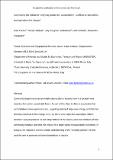Files in this item
Community-led initiatives’ everyday politics for sustainability – Conflicting rationalities and aspirations for change?
Item metadata
| dc.contributor.author | Fischer, Anke | |
| dc.contributor.author | Holstead, Kirsty Lee | |
| dc.contributor.author | Hendrickson, Cary | |
| dc.contributor.author | Virkkula, Outi | |
| dc.contributor.author | Prampolini, Alessandra | |
| dc.date.accessioned | 2017-06-14T09:30:13Z | |
| dc.date.available | 2017-06-14T09:30:13Z | |
| dc.date.issued | 2017-09-01 | |
| dc.identifier | 250207179 | |
| dc.identifier | 53cf6b87-594c-465d-968e-aee551f4b573 | |
| dc.identifier | 85027048015 | |
| dc.identifier | 000407469400004 | |
| dc.identifier.citation | Fischer , A , Holstead , K L , Hendrickson , C , Virkkula , O & Prampolini , A 2017 , ' Community-led initiatives’ everyday politics for sustainability – Conflicting rationalities and aspirations for change? ' , Environment and Planning A , vol. 49 , no. 9 , pp. 1986-2006 . https://doi.org/10.1177/0308518X17713994 | en |
| dc.identifier.issn | 0308-518X | |
| dc.identifier.uri | https://hdl.handle.net/10023/10989 | |
| dc.description | This project has received funding from the European Union’s 7th Framework Programme for Research, Technological Development and Demonstration (Grant Agreement no. 603705) through TESS (Towards European Social Sustainability, http://www.tess-transition.eu/). | en |
| dc.description.abstract | Community-based initiatives are widely seen to play an essential role in a societal move towards a low carbon, sustainable future. As part of this, there is often an assumption that such initiatives share expectations (i.e. a guiding vision) of large-scale change and that their activities contribute to this change. Here, we ask to what extent this assumption reflects members’ own perspectives on and interpretations of the aims and ambitions of their community initiative, and what this implies for a larger vision of sustainability transitions. In doing so, we respond to calls for a better understanding of the ‘everyday politics’ of what could be seen as processes of societal transitions in practice. We conducted qualitative interviews with members of five community initiatives in Italy, Finland and the UK. In each of these initiatives, we found a range of aspirations (i.e. outcome-related aims) and rationalities (i.e. procedural guiding principles). While some of these aims and ways of working were compatible with each other, we identified three major tensions that could be found across our study initiatives. These tensions centred on (i) the degree of politicisation of the initiative, (ii) the extent to which financial aims should take priority and (iii) questions of organisational form. We interpret these tensions as conflicting expressions of larger, societal-level discourses, and argue that this diversity and resulting conflicts need to be acknowledged – both in transition research and at the practical level – to avoid co-optation and disenfranchisement. | |
| dc.format.extent | 243614 | |
| dc.language.iso | eng | |
| dc.relation.ispartof | Environment and Planning A | en |
| dc.subject | Discourses | en |
| dc.subject | Expectations | en |
| dc.subject | Grassroots | en |
| dc.subject | Low carbon | en |
| dc.subject | Transitions | en |
| dc.subject | HD Industries. Land use. Labor | en |
| dc.subject | HT Communities. Classes. Races | en |
| dc.subject | NDAS | en |
| dc.subject | SDG 15 - Life on Land | en |
| dc.subject.lcc | HD | en |
| dc.subject.lcc | HT | en |
| dc.title | Community-led initiatives’ everyday politics for sustainability – Conflicting rationalities and aspirations for change? | en |
| dc.type | Journal article | en |
| dc.contributor.institution | University of St Andrews. School of Management | en |
| dc.identifier.doi | 10.1177/0308518X17713994 | |
| dc.description.status | Peer reviewed | en |
This item appears in the following Collection(s)
Items in the St Andrews Research Repository are protected by copyright, with all rights reserved, unless otherwise indicated.

